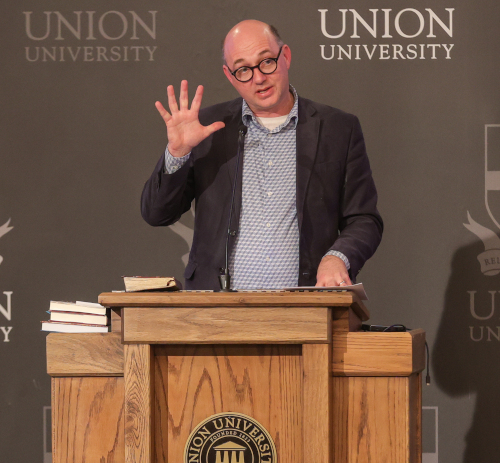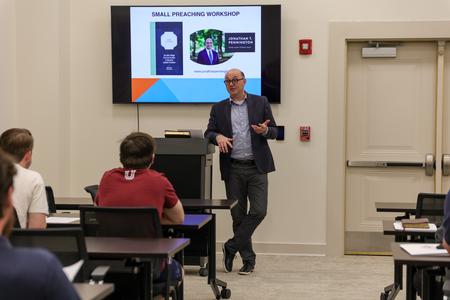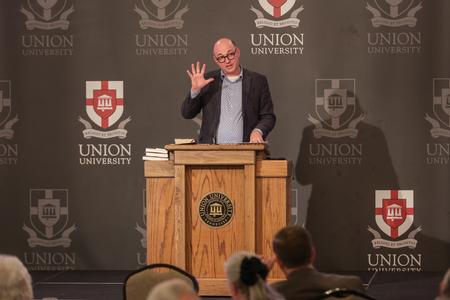JACKSON, Tenn. — March 26, 2024 — Jonathan Pennington, professor of New Testament interpretation at Southern Baptist Theological Seminary, spoke on the importance, purpose and context of the Sermon on the Mount.
Pennington was the featured speaker at Union University’s 2024 Spring Bible Conference March 22-23, presented by the Ryan Center for Biblical Studies.
“Julian, Augustine, you name it – they all talk about how this sermon is really key to understanding the rest of the Bible, that it’s the center of it,” Pennington said. “It is so influential, that the way that people read it affects their whole theology.”
Pennington spoke in four sessions on the Sermon on the Mount, showing it to be a guide for Christian living as well as key to understanding Jesus’ teaching. The Friday night plenary was an “Introduction to the Greatest Sermon in the World,” discussing the sermon’s context and the Beatitudes.
“There are so, so many sayings from the Sermon on the Mount that have woven their way into all of society,” Pennington said. “They have influenced ones that aren’t Christian at all.”
Pennington said the Sermon on the Mount is a piece of wisdom literature like Proverbs and Ecclesiastes. In it, Jesus instructs his disciples on how to live a good life, starting with the Beatitudes.
Pennington said the word “beatitude” comes from the Latin word “beatus” that Jerome used in the opening passage of the sermon in the Vulgate. This word does not mean “blessed,” as the English Bible translates, but no longer has a direct English translation.
“‘Beatus’ translates to something more like ‘happy,’” Pennington explained. “What I think probably is the best word for that is ‘flourishing’ or ‘thriving’ – ‘abundant life,’ like it says in John 10:10.”
Pennington said that the archaic English term “macarism” is similar to “beatitude.” Macarisms are sayings of a telling students how to live well. In the same way, the Beatitudes help direct Jesus’ disciples to live according to his teachings.
“God is constantly inviting us into a life of flourishing – inviting us with wisdom,” Pennington said. “Everyone is offering you a vision for how to find the good life, and Jesus is not afraid to address this because he has come to bring men life and bring it abundantly.”
Pennington also said proper context is important for reading both the Beatitudes and the whole of the Sermon on the Mount to interpret it correctly. This includes the Matthew’s literary context, which explains the structure of the chapters; the canonical context, placing it as a part of the whole of Scripture; and the Greco-Roman philosophical context, showing the sermon was influenced by the world it was in.
“We really have to pay attention to the multiple contexts in which the sermon appears,” Pennington said. “Because I have really come to see that one of the main ways it is misunderstood is when people divorce it from these contexts.”
Michael Tankersley, a junior biblical studies and languages major and Pennington’s introducer, said attending the plenary provided valuable direction for studying the Sermon on the Mount.
“This was incredibly helpful,” Tankersley said. “I really appreciated the metaphors he used – they really brought life into words that were very common to me as somebody who’s been in church.”
The conference also included four parallel sessions which focused on interpreting and applying Scripture. These were led by Kelvin Moore and Justin Wainscott, faculty members in Union’s School of Theology and Missions; Benjamin Quinn, associate professor of theology at Southeastern Baptist Theological Seminary; and Russ Quinn, associate pastor at Englewood Baptist Church in Jackson.



